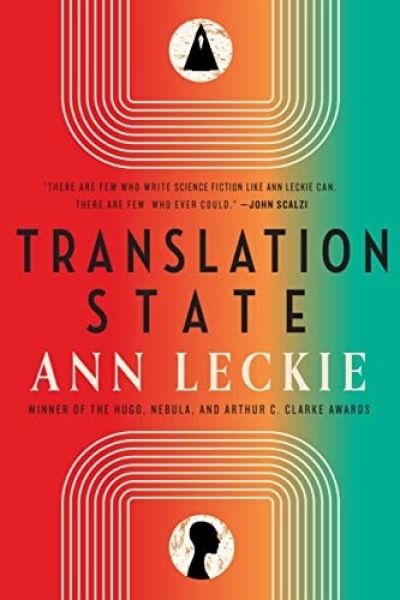Last True Mouthpiece
Translation State
By Ann Leckie

11 Jul, 2023
Ann Leckie’s 2023 Translation State is a stand-alone space opera novel. Translation State shares a setting with Leckie’s earlier Ancillary trilogy and with Provenance. It is Leckie’s first SF novel this decade.
Several plotlines eventually coalesce.
● Reet Hluid was a foundling, raised by doting adoptive parents without any idea who his parents might have been. Heroth Nadkal, President of the Siblings of Hikipu, believes he knows from what revered lineage Reet sprang. Glorious destiny awaits!
Formerly led by the lost-vanished Schan, the Hikipu are a fractious ethnic group. Shared loathing of their Phen oppressors has as yet been insufficient to unify the Hikipu into a functional resistance effort, thus Phen suppression of Hikipu language and culture continues unabated. The best hope for unity might be a Schan heir but alas, the Schan appear to be extinct.
Nadkal astonishes Reet with the revelation that he might be a Schan, While there is absolutely no documentation to support this, and while Reet does not look Hikipu, Reet’s genetics are known to be a bit unusual, as are some elements of his behavior. Nadkal is certain the most plausible explanation is that Reet is a Schan. Only the worst sort of cynic would point out that this unlikely claim is very convenient for Nadkal.
● Enae Athtur served the Athtur matriarch faithfully until the old woman’s death. The designated heir has no particular hostility towards Enae, but at the same time does not want Enae hanging around the Athtur estate. Accordingly, Enae is provided with an allowance and a seemingly impossible task: determine the whereabouts of a Presger Translator who vanished two centuries earlier.
What are Presger Translators? The Presger are nigh-Lovecraftian aliens and Translators are the means by which Presger communicate with humans and similar species. Translators were created from human DNA acquired by unspeakable means. Translators look human but it is widely agreed that appearances are misleading. Coexistence with the Presger is dependent on the Translators.
The quest is a fool’s errand whose purpose is to keep Enae busy far from the Athturs’ native Saeniss Polity. Nobody expects Enae to actually find the fugitive. Enae doesn’t. What Enae does find is that fugitive’s illicit offspring, who is none other than Reet.
● Victimized Qven was spared liquidation only because to execute Qven would be for Qven’s Translator clade to admit failure. To what use Qven may be put is unclear, until word comes that a Translator’s progeny has turned up in human space. Due to peculiarities in Translator life-cycles, an expendable youth is needed to merge with the wolfling Translator. Qven is chosen for the role.
Genetic destiny or not, Qven does not want to merge with another. Reet for his part believes passionately that he is a human and does not want to be dragged back to Translator space. Which shall win? Human rights or political expedience?
~oOo~
SF sure loves its courtroom dramas. Still, better jaw-jaw than war-war.
A warning for a certain faction of easily alarmed melancholy and/or infected young dogs: this book contains pronouns. I don’t think there are any taverns per se but I wouldn’t rule it out.
While the Presger remain comfortably off-stage and while human language lacks the ability to properly convey their true nature, what glimpses we get via the Translators are sufficiently disquieting that one can understand why every other species is terrified of them.
This novel appears to be an exercise in rejecting and dismantling certain beloved SFFnal tropes. Reet, for example, is presented as a futuristic “Lost Dauphin.” As Reet discovers, not only this claim as likely to be factual as similar claims from Huckleberry Finn’s Duke and Dauphin, but even if it were true, this might not necessarily be to his benefit. The Hikipu make a poor case that is in anyone’s interest to lead them1, while the brutal Phen might decide that it would prudent to dispose of Reet.
Similarly, there is a vast amount of science fiction devoted to inexorable genetic destiny. See, for example, a well-known SF franchise adapted yet again to the screen. While it’s true Reet is subject to certain biological imperatives, both he and Qven have a considerable range of choice about how to respond to them.
My only real complaint about the novel is that I expected Enae to play a much greater role than Enae actually does. Otherwise, this was an entertaining return to Leckie’s Radchaai setting.
Translation State is available here (Amazon US), here (Amazon Canada), here (Amazon UK), here (Apple Books), here (Barnes & Noble), and here (Chapters-Indigo).
1: On the one hand, they are most definitely oppressed. On the other, they are quite fond of utterly ludicrous conspiracy theories, some of which make managing human-Presger relations much harder than they need to be. Perhaps you can think of some real-world examples of self-deluded idiots stubbornly denying the existence of potential existential threats, idiots that Leckie might have had in mind here.
